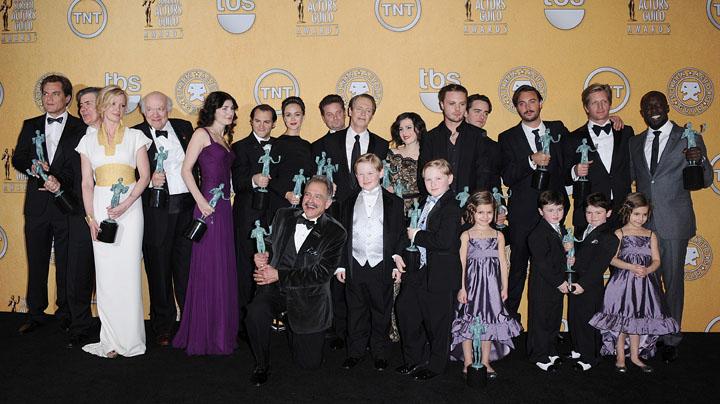Boardwalk Empire Series Reflection: Part 1
The cast of “Boardwalk Empire” with their awards backstage at the 18th Annual Screen Actors Guild Awards show at the Shrine Auditorium in Los Angeles, California, on Sunday, January 29, 2012. (Lionel Hahn/Abaca Press/MCT)
When a series is backed by a big budget network like HBO, is developed and written by some of the most dynamic writers and directors in the company, shot with lavish period detail of a bygone era, and is filled to the brim with a plethora of some of the most privileged actors around, it’s definitely one for the ages.
Boardwalk Empire’s 5th season is its final outing for screenwriters Terence Winter (creator of The Sopranos) and Tim Van Patten, director/producer Martin Scorsese, and most unfortunately, their band of 1920s mobsters and merrymaking Atlantic City folk.
Even though the story of Enoch “Nucky” Thompson (Steve Buscemi), the fictionalized and corrupt interpretation of real life Atlantic City County Treasurer Enoch L. Johnson, has had its fair run along with all the bettors, visitors, partiers, and bootleggers, the show, with its intricate scope of exceptionally defined characters and divided plotlines spanning from the Northern to Midwestern United States, could have remained for at least a few more seasons. Winter originally proposed it would run for 6 seasons.
Last season we saw heroin and liquor business associates Charles “Lucky” Luciano (Vincent Piazza) and his partner Meyer Lansky (Anatol Yusef) still working their way to the top of New York City’s mob chain, and it is expected this season that their initial foundation for “The Commission” should lead up to the further development of the National Crime Syndicate, therefore becoming a primary focus of the story (the real Luciano in his later years was touted as the father of organized crime).
It is still unknown as to whether or not a young Benjamin “Bugsy” Siegel (Michael Zegen) will have any further involvement in the founding of the syndicate with Luciano and Lansky reaching their prime. Meanwhile we saw Al Capone (Stephen Graham, Gangs of New York, Snatch) finally start to make his mark on Illinois in becoming the famous icon of the criminal underworld, after years of proving himself to his mentor Johnny Torrio (Greg Antonacci).
At the same time, we saw Nelson Van Alden (Michael Shannon, Man of Steel, 8 Mile), a former overzealous Federal Agent, still posing as humble salesman “George Mueller” while currently on the lam from the Bureau of Internal Revenue for drowning his partner, based on a hunch that said partner was revoking the investigation of Nucky Thompson in Season 1.
By the end of Season 4, we saw Nelson, who also used to be a devout Christian extremist for the untamable roaring 20s let go of his Eliot Ness veneer and divine faith, and finally decide to embrace his psychotic antics of brutality, deceit, and end up pursuing a road that has him reaching all the requirements of being the ideal criminal. After standing up to Capone and Torrio’s North side rival, Dean O’Banion (Arron Shiver), Van Alden proves his worth as Capone’s muscle and/or enforcer by defecting over to his side, leaving his helpless florist “boss” at the hands of Capone and his associates. While tending to family matters Nelson must also continue to work on his home and provide for his unofficially married yet beloved Norwegian wife, Sigrid (Christiane Seidel), and their two kids in Cicero.
I think Van Alden is arguably the current most standout, well written, and resilient character of the series. Because of his enigmatic and eerie persona, Van Alden is reminiscent of someone you might encounter in a Coen brothers film or in the Hunter S. Thompson universe. Along with thoughtful casting, the infernal and animalistic nature of Van Alden is mounted by Shannon’s looming intense screen presence with yet another delightfully demented and versatile performance.
Whether it was unintended or not, the writing for Shannon’s character gives an informal yet intriguing portrayal of a disturbed and existentially confused individual who wants to practice goodwill as a testament to some of the victims of the irrational ideals of Prohibition. Ultimately, Van Alden is more or less taken as an embodiment of the contradicting virtues of the 20s as well as to those who were lost in the crossfire of the unwieldy nature of the decade.
To be continued…


